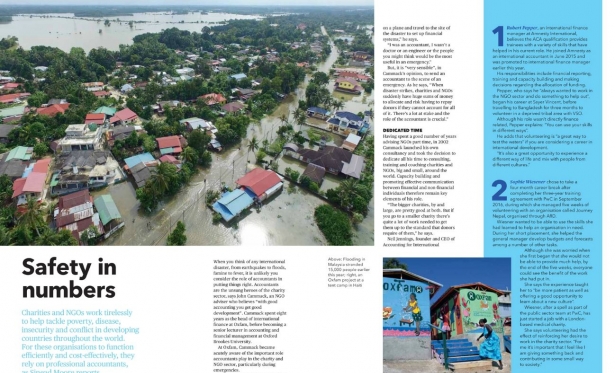AfID volunteers Eloise, Kit and Sophie featured in ICAEW magazine10.04.2017
Charities and NGOs work tirelessly to help tackle poverty, disease, insecurity and conflict in developing countries throughout the world. For these organisation to function efficiently and cost-effectively, they rely on professional accountants, as Sinead Moore reports.
When you think of any international disaster, from earthquakes to floods, famine to fever, it is unlikely you consider the role of accountants in putting things right. Accountants are the unsung heroes of the charity sector, says John Cammack, an NGO adviser who believes “with good accounting you get good development”. Cammack spent eight years as the head of international finance at Oxfam, before becoming a senior lecturer in accounting and financial management at Oxford Brookes University.
At Oxfam, Cammack became acutely aware of the important role accountants play in the charity and NGO sector, particularly during emergencies. “When an emergency struck, I was always one of the first people to get on a plane and travel to the site of the disaster to set up financial systems,” he says.
“l was an accountant, I wasn’t a doctor or an engineer or the people you might think would be the most useful in an emergency.” But, it is “very sensible”, in Cammack’s opinion, to send an accountant to the scene of an emergency. As he says, “When disaster strikes, charities and NGOs suddenly have huge sums of money to allocate and risk having to repay donors if they cannot account for all of it. There's a lot at stake and the role of the accountant is crucial.”
Having spent a good number of years advising NGOs part time, in 2002 Cammack launched his own consultancy and took the decision to dedicate all his time to consulting, training and coaching charities and NGOs, big and small, around the world. Capacity building and promoting effective communication between financial and non-financial individuals therefore remain key elements of his role.
“The bigger charities, by and large, are pretty good at both. But if you go to a smaller charity there’s quite a lot of work needed to get them up to the standard that donors require of them," he says.
Neil Jennings, founder and CEO of Accounting for International Development (AfID), adds, “There are small charities and NGOs right across the developing world doing incredible things, often in the most difficult of circumstances. But it is important to remember that these activities can only happen if the right financial infrastructure exists.
“lf a school in a slum in Malawi hasn’t budgeted properly it might run out of funds halfway through the year and be unable to pay for school meals or wages. It might even have to close. If a women’s refuge in Nepal doesn’t make effective use of limited income it might have to turn away vulnerable women and girls. If a health clinic in rural Tanzania isn’t able to produce clear and transparent financial reports, its international donor might have to withdraw vital funding.”
However, many community-based organisations cannot afford qualified accounting personnel and often lack the resources they need to access training for their existing teams, who are faced with the complex reporting requirements of overseas donors.
“Accountants are often surprised at just how helpful they can be to charities operating in developing countries,” says Jennings. He points out that AfID works with almost 500 charity partners operating in over 50 countries, organising volunteer assignments and longer, sometimes paid placements to help build the financial capacity of charities around the world.
Jennings says volunteer accountants provide invaluable help. “They can be building the confidence of local staff and providing a sound knowledge of the basics. The challenge for all our volunteers, from part-qualified accountants to those with 40 years’ experience, is to use the skills and knowledge they have built up through their studies and career in a way that local staff are going to be able to understand and use sustainably after they have left.”
AfID runs regular workshops at Chartered Accountants’ Hall, London, providing information and advice for both accountants looking to volunteer overseas and those looking for a career in the sector, outlining how the role of the accountant can make a genuine difference.
Volunteer Profiles
1. Robert Pepper, an international finance manager at Amnesty International, believes the ACA qualification provides trainees with a variety of skills that have helped in his current role. He joined Amnesty as an international accountant in June 2015 and was promoted to international finance manager earlier this year. His responsibilities include financial reporting, training and capacity building and making decisions regarding the allocation of funding.
Pepper, who says he "always wanted to work in the NGO sector and do something to help out", began his career at Sayer Vincent, before travelling to Bangladesh for three months to volunteer in a deprived tribal area with VSO.
Although his role wasn't directly finance related, Pepper explains: "You can use your skills in different ways". He adds that volunteering is "a great way to test the waters" if you are considering a career in international development. "It's also a great opportunity to experience a different way of life and mix with people from different cultures."
2. Sophie Wiesener chose to take a four-month career break after completing her three-year training agreement with PwC in September 2016, during which she managed five weeks of volunteering with an organisation called Journey Nepal, organised through AflD.
Wiesner wanted to be able to use the skills she had learned to help an organisation in need. During her short placement, she helped the general manager develop budgets and forecasts among a number of other tasks.
Although she was worried when she first began that she would not be able to provide much help, by the end of the five weeks, everyone could see the benefit of the work she had put in. She says the experience taught her to "be more patient as well as offering a good opportunity to learn about a new culture".
Wiesner, after a spell as part of the public sector team at PwC, has just started a job with a London-based medical charity. She says volunteering had the effect of reinforcing her desire to work in the charity sector. “For me it's important that I feel like I am giving something back and contributing in some small way to society."
3. Describing it as "the best thing I have ever done", Eloise Cook travelled to Cambodia to volunteer for six weeks with Together for Cambodia, an organisation providing a safe home and education to disadvantaged children, in July last year, shortly before receiving her full membership of ICAEW.
The placement was arranged through AflD, an organisation Cook stumbled upon by accident, "while looking for interesting ways to get into the international development sector".
Cook says the ability to explain financial information to non-financial people was vital during her time in Cambodia. She was able to draw on "the broad range of skills" learned throughout her ACA studies to help the organisation's finance officer, a local accountant in the process of doing her exams, set up a new reporting system. Cook also tried to pass on analytical skills and the desire to understand how things work, another skill she picked up during her studies.
For Cook, the opportunity to train someone one-on-one was invaluable, and an opportunity she might not otherwise have had so early in her career. She adds that the experience helped in her search for a permanent position in the charity sector, as well as her voluntary role at the Yorkshire Dales Rivers Trust.
She encourages trainees considering a career in international development to volunteer, "whether for two weeks during your annual leave or six months". As she explains: "Even if you come back and decide you don't want to work in the sector, the skills that you learn and the life experience you gain are invaluable."
4. Kit McCormick, a consultant at BDO, travelled to Tanzania in October 2016 for a five-week volunteer placement at the llowola Secondary School. He helped build a structure that allowed the bursar and the organisation's director to look at reports, weekly, monthly, quarterly, and annually so that the school and its businesses could be overseen more effectively.
"The most important thing is that you put something in place that is understood," he says. "A lot of the time they didn't know they needed something, so you have to be able to adapt your message and your training to ensure they understand." He adds that training people from quite a low level "really challenges your own understanding of things".
McCormick sums up the experience as refreshing after he had spent three and a half years working as an accountant in a professional environment. “It's an amazing experience that pushes you out of your comfort zone and once you've done it, it's something you want to do again," he says.
And, he is anxious to stress: "Chartered accountants are hugely valuable to NGOs as charities need reputable people. It's a respected profession and it allows you to go and help other people that may need the expertise that you've developed."
Original article taken from ICAEW's student magazine VITAL


